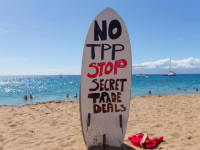The last two Trouble with the TPP posts have focused on the agreement’s investor-state dispute settlement provisions, noting that they do not meet the standard set by the Canadian government in CETA and do not address key concerns over policy making as raised in the Bilcon case. The risks associated with ISDS rules are far more than just the subject of academic or legal debate. Experience shows that the cases can place billions of tax dollars at risk, threatening to wipe out the supposed “gains” created by trade deals.
The current legal battle between the Canadian government and international pharmaceutical giant Eli Lilly provides an illustration of what can happen when ISDS rules go wrong. In the early 1990s, the company applied for patent protection in Canada for two chemical compounds, olanzapine and atomoxetine. The company had already obtained patents over the compounds, but asserted that it had evidence to support new uses for the compounds that merited further protection. The Canadian patent office granted the patents based on the content in the applications, but they remained subject to challenge.

![By Vulkano , Uwe H. Friese , Bremerhaven (Own work) [GFDL (http://www.gnu.org/copyleft/fdl.html) or CC BY-SA 3.0 (http://creativecommons.org/licenses/by-sa/3.0)], via Wikimedia Commons](https://www.michaelgeist.ca/wp-content/uploads/2016/03/1024px-Zyprexa_004_be_uf-200x150.jpg)









